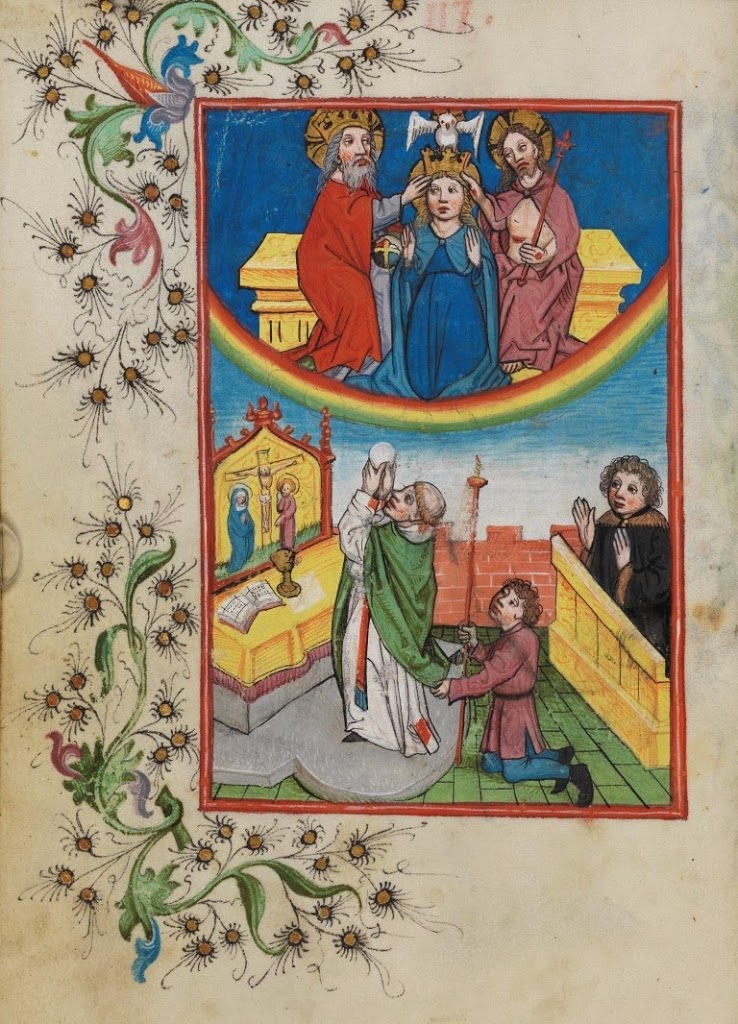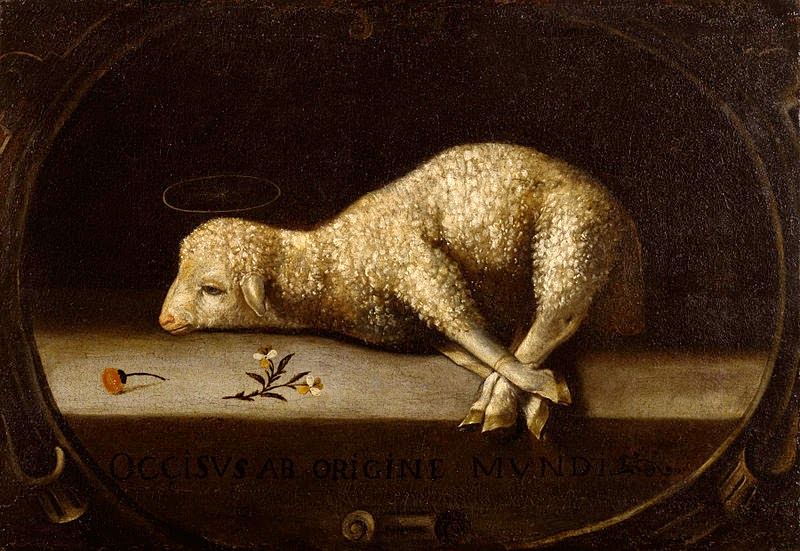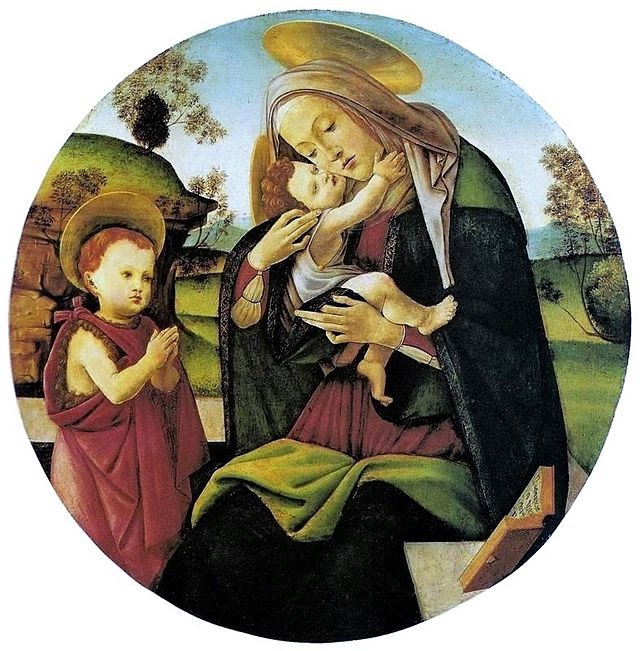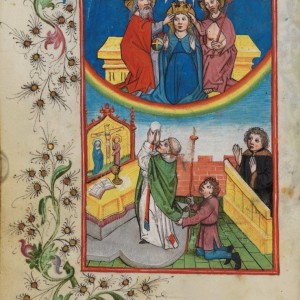 |
| Image from the Waldburg Prayer Book (1476), showing the Coronation of Mary, and the Sacrifice of the Mass |
Stat crux dum volvitur orbis is the motto of the Carthusian religious order. It’s Latin for “The Cross is steady while the world is turning.” It’s a recognition that the Gospel is timeless and eternal. But the Gospel is also historical. The Gospel is part of history, because Christ entered history in His Incarnation. So we see, in every age, the Church presenting the timeless truths of the Gospel in a way that the surrounding world can understand. She’s used different methods, but always with the same message.
This understanding of the Gospel is challenged from two sides. On the one hand, you have those who claim that the Church needs to “get with the times” by abandoning her teachings. It’s sadly common for people to leave the Church due to disagreements over political issues. They’ve become so convinced of their own political views that they treat the Church’s views as outdated and false. This is a rejection of the Gospel’s timelessness.
On the other hand, you have those who treat Christianity as a do-it-yourself project, as if the way to discover the truth of Christianity is to pick up the Bible and piece together what you imagine this to mean. This is a rejection of the Gospel as historical. It would be a bit like starting your own country, based upon your interpretation of the U.S. Constitution. No matter how close you got to the original spirit of the Constitution, the end result wouldn’t actually be America. So it is here, in the Church’s relationship to the Gospel,
Both of these errors – rejecting either the timelessness or historicity of the Gospel – are answered by the Bible.
Several promises are made to ensure us that the truths of the Gospel will remain uncorrupted forever, This means that they don’t need to be “updated” to get with the times, or “rediscovered,” as if they could be lost. Let’s look at five specific times that Scripture points to the future to tell us what the post-Apostolic Church would be like.
At the Last Supper, Jesus promises to send the Holy Spirit, to guide the Church into the fullness of truth (John 14:25-26):
“These things I have spoken to you, while I am still with you. But the Counselor, the Holy Spirit, whom the Father will send in my name, he will teach you all things, and bring to your remembrance all that I have said to you.
What’s more, He promises that this Spirit of Truth, the Holy Spirit, will remain with us forever (John 14:16-17):
And I will pray the Father, and he will give you another Counselor, to be with you for ever, even the Spirit of truth, whom the world cannot receive, because it neither sees him nor knows him; you know him, for he dwells with you, and will be in you.
A little later in the same discourse, Jesus reiterates this same point (John 16:13):
When the Spirit of truth comes, he will guide you into all the truth; for he will not speak on his own authority, but whatever he hears he will speak, and he will declare to you the things that are to come.
This is really a twofold promise: that the Holy Spirit will remain with the Church forever, and that the Holy Spirit will preserve the Church in the fullness of truth.
On the surface, this isn’t a promise at all, but a prayer. It’s also from the Last Supper discourse in John’s Gospel, in which Jesus prays for us, the post-Apostolic Christians (John 17:18-23):
As thou didst send me into the world, so I have sent them into the world. And for their sake I consecrate myself, that they also may be consecrated in truth.
I do not pray for these only, but also for those who believe in me through their word, that they may all be one; even as thou, Father, art in me, and I in thee, that they also may be in us, so that the world may believe that thou hast sent me. The glory which thou hast given me I have given to them, that they may be one even as we are one, I in them and thou in me, that they may become perfectly one, so that the world may know that thou hast sent me and hast loved them even as thou hast loved me.
But if you look closely, there’s a promise contained in this prayer: that we’ll be able to preserve unity because of the glory that Christ has given the Church. He has consecrated the Church in the truth. And it’s only due to this that we can remain with the Church forever.
If this weren’t the case, we’d be forced into a catch-22. If the Church somehow lost the fullness of truth and started teaching heresy, we would be forced to either accept heresy, or go into schism. But Scripture condemns both of those things, so we would be damned if we did, and damned if we didn’t. In instructing us to remain with the Church forever, Christ is letting us know that we’ll never have to make that choice.
 |
| Josefa de Ayala, The Sacrificial Lamb (c. 1680) |
The Passover was established as a perpetual celebration, to last forever (Exodus 12:13-14):
The blood shall be a sign for you, upon the houses where you are; and when I see the blood, I will pass over you, and no plague shall fall upon you to destroy you, when I smite the land of Egypt. This day shall be for you a memorial day, and you shall keep it as a feast to the Lord; throughout your generations you shall observe it as an ordinance for ever.
Christ doesn’t abolish the Passover. Rather, He fulfills and perfects it. In His Passion and Death, “Christ, our paschal lamb, has been sacrificed” (1 Corinthians 5:7). But this Paschal Sacrifice begins at the Last Supper – which, not coincidentally, is a Passover meal (Luke 22:14-16):
And when the hour came, he sat at table, and the apostles with him. And he said to them, “I have earnestly desired to eat this passover with you before I suffer; for I tell you I shall not eat it until it is fulfilled in the kingdom of God.”
Luke’s description of the Last Supper is filled with meaning, as when he says that it all happens on “the day of Unleavened Bread, on which the passover lamb had to be sacrificed” (Luke 22:7). He plainly has two lambs in mind: the lamb of the Old Covenant, and the Lamb of God who takes away the sins of the world (John 1:29).
In the Jewish Passover, there are two separate actions, performed on separate days: (1) the lamb is slaughtered, and (2) the lamb is eaten. These correspond to (1) Good Friday, and (2) the Last Supper and the Mass.
Good Friday, Jesus’ death on the Cross, occurs “once for all” (Romans 6:10; Hebrews 7:27). But the Last Supper isn’t designed to be “once for all.” Rather, Christ instructs His Apostles to “Do this in remembrance of me” (Lk. 22:19). The memorial of the Passover becomes the Memorial of the Last Supper.
St. Paul explains this view of the Eucharistic Liturgy as a Sacrifice by comparing it to Jewish and pagan sacrifices (1 Corinthians 10:18): “are not those who eat the sacrifices partners in the altar?” Therefore, the Eucharistic Sacrifice incorporates us into the Body and Blood of Christ (1 Cor. 10:16-17):
The cup of blessing which we bless, is it not a participation in the blood of Christ? The bread which we break, is it not a participation in the body of Christ? Because there is one bread, we who are many are one body, for we all partake of the one bread.
For from the rising of the sun to its setting my name is great among the nations, and in every place incense is offered to my name, and a pure offering; for my name is great among the nations, says the Lord of hosts.
We hear this in the first century Didache, which describes the Sunday Mass:
But every Lord’s day gather yourselves together, and break bread, and give thanksgiving after having confessed your transgressions, that your sacrifice may be pure. But let no one who is at odds with his fellow come together with you, until they be reconciled, that your sacrifice may not be profaned. For this is that which was spoken by the Lord: “In every place and time offer to me a pure sacrifice; for I am a great King, says the Lord, and my name is wonderful among the nations.“
So we can rest assured that the Mass will continue, day after day, week after week, from the time of Christ until the end of time. And in fact, beyond that: if you read Luke 22:14-16 closely, you’ll see that Christ promises the ultimate fulfillment of the Last Supper will occur “in the Kingdom of God.” This is a reference to the Eucharistic Banquet of Jesus the Bridegroom and the Church His Bride, in which our union is perfectly consummated (Revelation 19:9).
 |
| Sandro Botticelli, Virgin and Child with the Infant St. John the Baptist (1500) |
In Mary’s famous Magnificat prayer, she proclaims (Lk. 1:46b-49)
My soul magnifies the Lord,
and my spirit rejoices in God my Savior,
for he has regarded the low estate of his handmaiden.
For behold, henceforth all generations will call me blessed;
for he who is mighty has done great things for me,
and holy is his name.
Mary is both prophesying what’s going to happen — that every generation of Christians will praise her — and letting us know that this is what ought to happen. She says that this praise of her is due to the holiness of God. In other words, Mary tells us that honoring her doesn’t detract from God’s holiness, but flows from it.
Stop and think about what this means. Mary’s not just talking about the tepid, lukewarm praise of modern Christians who are afraid that praising Mary will somehow make her Son jealous. Mary’s talking also about all of those generations who praised her unabashedly,
For example, the praise offered by the third-century Church included St. Gregory the Wonderworker’s prayer:
Now is it meet and fitting for me to wonder after the manner of the Holy Virgin, to whom in seemly wise before all things the angel gave salutation thus: “Be thou glad and rejoice”; because with her are quickened and live, all the treasures of grace. Among all nations she alone was both virgin and mother and without knowledge of man, holy in body and soul. Among all nations she alone was made worthy to bring forth God; alone she carried in her Him who carries along all by His word.
It would be easy to write texts like these off as the excessive devotion of one or two individuals: as not representative of their generation. That doesn’t work, however, when dealing with popular devotion, or with the Liturgy.
The Liturgy in both the West and (especially) the East praises Mary in strong terms. For example, in the Divine Liturgy of Saint John Chrysostom, the most common Eucharistic liturgy for Eastern Orthodox and Byzantine Catholics, the people pray:
It is truly right to bless you, Theotokos [Mother of God; lit. God-bearer], ever blessed, most pure, and mother of our God. More honorable than the Cherubim, and beyond compare more glorious than the Seraphim, without corruption you gave birth to God the Word. We magnify you, the true Theotokos.
That’s what Mary means when she says that all generations will call her blessed. And she says this as if this is a good thing.
One last promise from John’s account of the Last Supper. In John 14:18, Jesus promises, “I will not leave you desolate; I will come to you.” One way that He fulfills this is by sending the Holy Spirit. But He also promises to remain with us, as the last line of Matthew’s Gospel shows: “I am with you always, to the close of the age” (Matthew 28:20). And in His promise to the Church, Jesus famously says to Peter (Matt. 16:18-19):
And I tell you, you are Peter, and on this rock I will build my church, and the powers of death shall not prevail against it. I will give you the keys of the kingdom of heaven, and whatever you bind on earth shall be bound in heaven, and whatever you loose on earth shall be loosed in heaven.
To be sure, we might still fall away from the Church (although Christ prays that we won’t: see #2). But the Church itself will last forever. And not just last forever, but remain with the fullness of truth (see #1).
Compare what Christ and Mary promise in Scripture with what the Reformers and modern secularists offer. Broadly speaking, the Protestant Reformers denied each of these promises, claiming that:
- the Church didn’t have the fullness of truth anymore;
- it was morally right (even necessary) to break away from the Church;
- that the Mass wasn’t a real sacrifice, and should be eliminated;
- the sort of devotion to Mary offered throughout prior generations was offensive to the glory of God, and should be stopped; and
- the entire Church fell into apostasy at some point in the past.

Brilliant exposition. As usual.
Those promises are especially powerful when considered in light of the timeless omniscience of God.
Saint Vincent of Lerins (Commonitory) teaches us that God tests us to see if we really love him and so one way to look at our present difficulties in this time of turmoil is – we are being tested.
And the test has two grades; Heaven and Hell.
There is never any just reason for breaking even one of the Bonds of Unity – Worship, Doctrine, Authority -rather, we must man-up and act like men.
If you think this testing is tough, it is nothing compared to what Jesus endured out of love for us.
If we love Him we can never, ever, ever, leave His Church for in leaving His Church, we are abandoning Him.
It’s amazing how the Lord demands great patience and trust from His disciples and followers. And even His Mother’s future life was left a mystery to her until the very last moments of Jesus’ life. From the cross He said: “Woman, behold thy son. [27] After that, he saith to the disciple: Behold thy mother. And from that hour, the disciple took her to his own.”
Patience was demanded for an understanding of the Holy Eucharist also. And as we know, many of His disciples left Him due to a lack of this patience.
St. Joseph also needed patience in understanding the will of God at the Annunciation of Mary, and he received a dream to guide him and also to name the Son of God “Jesus”.
So, RAIDER FAN, you are correct. Scripture proves that in this life we are indeed being tested, even as Jesus was.
Very good
[url=http://www.gowatchs.com/brand-213.html]また1つの上位10位の選手はオメガ名人大使セルジオ・ガルシア(Sergio Garcia)、これはガルシアの第4回W杯。前に、彼はかつてデビュー2001、2004年と2005年の試合、今年は祖国を代表スペイン观澜湖までゴルフ会試合に参加する。ガルシアは2003年にオメガ名人大使大家庭も、今とオメガ協力6年ぶりに及ぶ。今年は手を携えてスペイン同胞Constancio塔ノ(Gonzalo Fernandez・Castano)と共に出場。ガルシア信じて優勝の鍵は相手を負かすことより、自分に「ここは何の優秀なチーム。実は、ワールドカップはいつも多くの優秀な選手が付いて参加し。私の最大の圧力から優勝自体を、私たちはこのために最大の努力を尽くす。ブルガリ時計スーパーコピー私は前に言った、ここには多くの非常に優れたチーム。私たちも一本の優れたチーム。もし私たちが私たちの才能を活かし、実際のレベルを打って、私達は優勝を目指す。」[/url]
[url=http://www.ooobag.com/wallet/louisvuitton/index_11.html]としての時にSwatchは腕時計のスタイルを求めても突破、非常に重い小売店のデザインコンセプトは現在、顧客のために新しい感覚。「Swatch利園山道旗艦店」を採用しスイス新しい「Ice Dunes -能登麻美子レディ」をデザインコンセプト、店内の内装を巧みに白を基調に歩道橋空間、ファッション、Swatchの腕時計やアクセサリーの主役になる台の上に、完全に製品の色を見せ斓マダラは緻し匠心独运の視覚に訴える。シャネルスーパーコピー 旗艦店の設備具高度柔軟性の資質、店内の内装がスピーディに交換によって展示の形は、多くの変化と強いイメージ効果以外に合わせて、新シリーズの発売のほかに、お客様によって新鮮で、客にファッション息の環境下にSwatchから潮~型の腕時計やアクセサリーシリーズは、ショッピングを満喫して楽しみ![/url]
[url=http://www.brandiwc.com/brand-super-29-copy-0.html]ティソパンパンシリーズの若い女性のすべての期待を満たすことができる。レディChronoダイヤモンドシリーズを深紅や白、日常や夜装着もとても適当。Danica Patrick君着用T-Race Lady、すなわち運動型は入社時;1916年Classic3ゴールドの再版、と入った自動ムーブメントのRetroゴールドもとても上品。それだけでなく、ティソも近く発売予定より多くを女性専用デザインの腕時計。[/url]
[url=http://www.bestevance.com/cartier/tank/]簡単にお気に入りの腕時計ユリスナルダンから彼らの有名な「フリーク」が、2001年以降、「アンチ・クラシック」の高級時計とモダンなデザインの時計nerderyが好きである人々のためでした。 ブルガリスーパーコピー ユーレッセナーディン彼らの有力なシリコン腕時計で賭け金を上げ続けるということを私は何より好きです(異常な機械的運動における成分としてのシリコン部分を含む最初のスイス時計の生産)、多くの特徴を加えて、システムの性能と耐久性を増やします。その心は、時計の長針に実際にあるダイヤルの上で全てのシリコンギヤ列を特徴とします。最新の生成・フリークで、「freaklabとして知られ、「ユリスナルダンをさらに追加し、会社の新しい社内」ulychoc」技術の衝撃吸収材として機能を含む。[/url]
[url=http://www.bestevance.com/cartier/solo/]当店は業界最強の海外一番人気のルイヴィトン スーパーコピー 代引き販売老舗です!高品質のルイヴィトンコピー代引きや情報が満載しています。私達は貴方の為に同等な品質のルイヴィトン代引きと価格安い商品を提供します.ご購入する度、ご安心とご満足の届けることを旨にしております[/url]
18(78)は、ブローヴァ腕時計マンチェスターユナイテッド・クラブの分のマーカーは、1878年(明治11年)の日付は、緑と金で印刷されます。これは非常に賢い(と超便利)クラブの起源へのうなずきです。鉄道の接続を参照して、ダイヤルの間の12時間18分のマーカーの端のまわりで列車トラックの範囲を実行します。これは我々に思い出させました輸入部のランカシャーとヨークシャーのレール・システムによってマンチェスターの開発においては産業革命の間に。
そしてシンガポールから上場グループ高登(Cortina)は4月以来台北101でMALL咲いHarry Winstonなど8大ブランドの大きい後、2か月近くには、宝のプラチナ表大きい登場しない于新宇グループを時計メーカーが直営大きいルート、高登時計を表展経営モデル開発大きい、所耗费コストが高い、相対的に回収も遅い。
最近、ティソ訪ねたジュネーヴの時計世界は、私たちと共有専門を女性の設計の新品。ティソほとんど定価1000ドル以下、五六桁の価格-製品価格から150ドルから、ちょうど適オフィスレディの気持ち、彼女たちに付き添って過ごす歳月に代えることができる自分が学生の旧表し、異なる場合デザインのものを購入する。